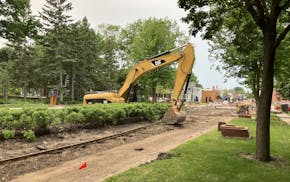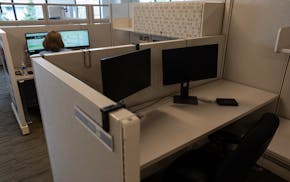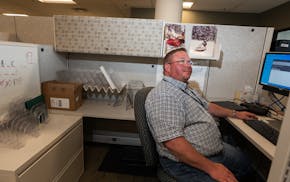Sofia Jenkins comes from a family of educators, but she initially resisted the pull to be a teacher herself.
Then came a return to Minneapolis, and a job as a special-education assistant, and now she's part of a multi-district cohort training to fill the high-demand role of special-education teacher.
"It's not just my education," Jenkins said of the quality nature of the new "Forward Together" teacher apprenticeship program. "I have a team and a community behind me."
Jenkins was among 25 apprentices introduced at the program's launch in August at the Edina campus of Minnesota State University, Mankato — with speakers including the superintendents of the Minneapolis, Owatonna and North Branch school districts.
On hand, too, were the mentors, so-called "journey teachers," who help apprentices put into practice what they learn as students themselves on Wednesdays.
At Justice Page Middle School in Minneapolis, Angel Dwyer, a veteran special-education teacher, was asked to be a mentor, but she hadn't had very good experiences with student teachers before, she said. She agreed, however, as long as she was paired with Jenkins.
"The drive is there. The passion is there. I've seen her connections with kids," Dwyer said. "In many regards, I feel very lucky because I hit the jackpot of a person that I can teach and I can learn from at the same time."
On a recent Thursday afternoon, Dwyer stood in her classroom doorway as kids passed by on the way to sixth-hour classes, and when the moment came for doors to close, she called out: "OK, that was the bell! Be successful. Make the world a better place."
Then, Dwyer turned to the day's assignment — a writing exercise — and a handoff to Jenkins.
"What'd you come up with, Ms. Sofia?" Dwyer asked.
"Write about what makes you happy," Jenkins told the students. "You're welcome to write a poem. You're welcome to freestyle it."
Jenkins then huddled with a girl wearing headphones, and as she stood up to go talk to another kid, she said to the girl: "Put your best effort into it."
The students had about 40 minutes left to create.
Immediate classroom application
A year ago, the state Department of Education spelled out the challenges confronting Minnesota's school districts during the next 10 years: 14,000 openings for middle and high school teachers and 18,000 elementary teacher openings. Special-education teachers long have been among the highest in demand.
"Grow your own" programs tailored to give a school district's paraprofessionals a lift in obtaining a teaching license have become more common, and those in St. Paul and Minneapolis have operated for years.
But Ryan Mulso, teacher apprenticeships administrator in Minneapolis, and Chris Picha, human resources director in Owatonna, say the Forward Together program is different.
Apprentices get their tuition and student-teacher wages paid in full. Perhaps most significantly, they are almost immediately applying what they've learned. That's a big departure from the typical, often unpaid student-teaching experiences that come after three to four semesters in college, Mulso said.
This was not easy to do. In May 2023, state officials pulled together representatives from about 200 districts to discuss apprenticeship opportunities, Picha said. In the end, just Owatonna, Minneapolis and North Branch had the wherewithal, primarily through grants, to make a program happen at the local level.
Sara Paul, superintendent of North Branch Area Schools, said deploying apprentices "with community-based connections will make a difference in student outcomes long-term."
Picha said the program should help with the recruitment of her district's special-education paraprofessionals: "If they stay here long enough they might be able to get in the program," she said.
But the program runs for two years and Owatonna would need the state's help to continue it, she said. Despite a recent state budget forecast warning of a $5.1 billion deficit in the 2028-29 biennium, she is undeterred.
"We've been talking with legislators," Picha said. "They know there's a teacher shortage. Show us the money."
Mulso, who visited apprenticeship classrooms two weeks into the new school year, said he was "floored" to see students already writing essays thanks to the apprentice-mentor teams.
"In a special-education classroom," he recalled thinking. "Whoa, you're bringing this."
Writings on display
Growing up, Jenkins attended what is now Justice Page Middle School twice in her years at Minneapolis schools. Today, the classroom walls in which she co-teaches are covered with art and with masks and with inspirational phrases. The view — all treetops, roofs and distant buildings — has always been amazing.
"We're very, very lucky," Dwyer said.
Jenkins' grandmother was a special-education teacher, her grandfather drove the school buses and her father is the athletics director at Washburn High School. Initially, she planned to be a communications major, but a fascination with the human development part of the brain and why kids do what they do led her to apply for a special-education assistant position at Justice Page. Once there, she never wanted to leave.
"I feel passionate, and like [Dwyer] said, I feel confident and I just want to learn. This intrigues me," Jenkins said. "It's kind of wrapped up everything that I have done up until this point. It has allowed me to use the tools in my toolbox to be the best educator I can be. And I'm still adding tools to that toolbox today."
By the end of the recent Thursday class, the girl with the headphones, who'd been encouraged by Jenkins, had written a poem. It was about a boy on whom she had a crush and it turned out she'd been listening to a song, "Maps," by the Yeah Yeah Yeahs, with the repeat lyric, "Wait, they don't love you like I love you."
Dwyer invited the students to share what they had written, and the girl walked across the room with her laptop to show the poem to a visitor, and when asked if he could take a picture of it, she said: "I'm honored."

On the campaign trail, Elon Musk juggled drugs and family drama
In South Carolina, Walz says Democrats 'need to change the attitude'

Grand Avenue reconstruction unearths streetcar tracks, showing St. Paul's past

What we know about state workers' return to office next week

